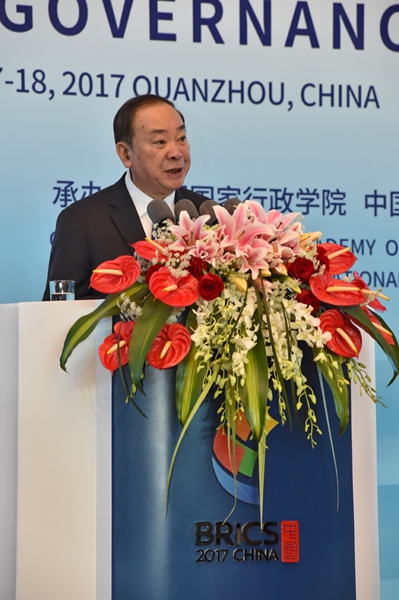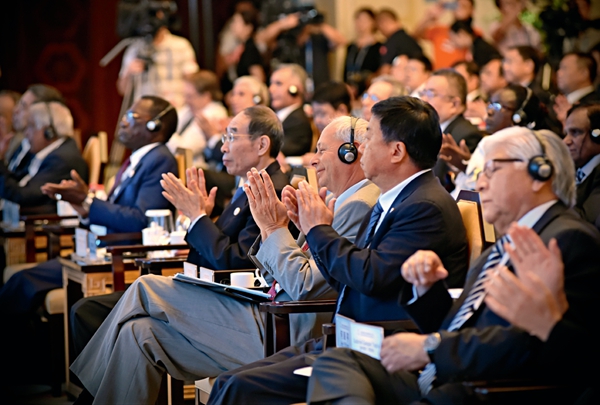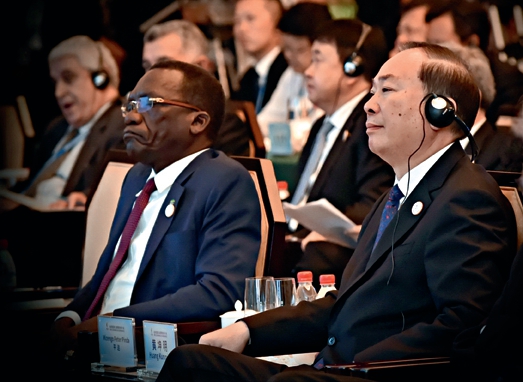– Keynote Speech at the BRICS Seminar on Governance
Quanzhou, Fujian Province August 17, 2017
Huang Kunming, Executive Vice Minister of the Publicity Department of the CPC Central Committee
IT gives me great pleasure to meet all of you here in the beautiful city of Quanzhou for an exchange of views on governance in BRICS countries. Quanzhou is a major starting point of the maritime Silk Road, a point of departure for Chinese people’s journeys overseas to develop friendly relations and a port city where we welcome visitors from all over the world with open arms. First of all, I would like to extend my warmest congratulations on the opening of the seminar and a heartfelt welcome to you all.

Promoting exchange of governance experience is an important consensus of BRICS leaders, to which President Xi Jinping attaches great importance. Xi has stressed the need to enhance mutual understanding, exchanges and learning on a number of occasions. The BRICS Seminar on Governance is a concrete step taken to put the leaders’ consensus into practice as well as a major event within the framework of the BRICS Summit in Xiamen. The seminar’s theme, “Openness, Inclusiveness, Mutual Benefit and Win-win: Working Together to Build a Community of Shared Future for Mankind,” conforms to the current wishes and aspirations of BRICS countries to strengthen dialogue and deepen cooperation. As participants share experience, exchange views and build consensus around this theme, the seminar is of great importance in enriching the outcomes of the BRICS Summit and helping usher in another golden decade for BRICS cooperation.
Over the past decade, BRICS cooperation has borne abundant fruit. A multi-level and all-dimensional cooperative framework led by the summit and covering a variety of areas has taken shape. The five BRICS countries have formed a community of common interests and joint action characterized by solidarity and collaboration for shared progress. Today, BRICS cooperation has flourished to assume an increasingly greater status and significant role in the international community. The reasons are at least three-fold: (1) We have given depth and substance to our cooperation in keeping with the BRICS spirit of openness, inclusiveness and win-win cooperation; (2) We have been active in promoting the reform of global governance, safeguarding international fairness and justice and helping increase the representation and voice of emerging markets and developing countries; (3) We have given top priority to development, improved national governance and made every effort to raise people’s living standards and advance their well-being. Against the backdrop of a fragile world economic recovery, BRICS countries have achieved an eye-catching performance with their great development potential. Their combined GDP accounts for nearly a quarter of the global total, with the group’s contribution to world economic growth exceeding 50 percent. It’s no exaggeration to say that they are the economic bellwether of the world.
Only with deep roots can a tree thrive. BRICS cooperation is deeply rooted in the prosperity and development of the five countries. Given their own national conditions, the countries have put in place governance systems and state policies in line with their respective realities. They have found their own development paths while gaining valuable governance experience in the process. In China, for instance, since the 18th National Congress of the Communist Party of China (CPC) in 2012, President Xi has proposed a series of new concepts, thoughts and strategies on governance based on the national conditions and development practices of contemporary China. These have helped bring about historic changes in the undertakings of the CPC and the state. Socialism with Chinese characteristics has moved into a new development stage. I would like to take this opportunity to share with you some of my observations on China’s governance since 2012.

First, pursuing a development path suited to China’s national conditions. Only when it comes up with a suitable path, can a nation accomplish its development goals. After long exploration, the Chinese people found their development path – socialism with Chinese characteristics under the leadership of the CPC. China’s achievements have proven that the path is correct and valid. Since the 18th CPC National Congress, the CPC Central Committee with Comrade Xi as the core has focused on adhering to and developing socialism with Chinese characteristics, promoted innovation in theory and practice and put forward the Chinese dream of national renewal, which has become a distinctive banner under which all Chinese people can forge ahead in unity. The CPC Central Committee has pushed for economic, political, cultural, social, and ecological progress in a coordinated way. It has adopted the Four-Pronged Comprehensive Strategy, which calls for completing the process of building a moderately prosperous society in all respects, pursuing all-round in-depth reform, implementing a comprehensive framework for promoting the rule of law and launching an all-out effort to enforce strict Party discipline. The strategy has become the master plan for China’s governance. It has also called for establishing and implementing new development concepts centered on innovative, coordinated, green, open and shared development, providing scientific guidelines for China’s economic and social progress. These concepts and strategies represent the top leadership’s vision for China’s governance. Under their guidance, we are making long strides along the path of socialism with Chinese characteristics.
Second, adopting a people-centered development philosophy. Enabling all ordinary people to live a good life is the starting point and objective of the governance of the CPC. It is our mission to meet their aspiration for a happy life. We need not only to make the pie bigger by developing the economy, but also to ensure it is shared by all. We have carried out a number of projects concerning people’s livelihoods. For instance, we have established the world’s largest basic medical care and old-age pension systems, through which people have shared in the benefits of the country’s reform and development with a growing sense of gains. By implementing the strategy of poverty alleviation and elimination with a targeted approach, the number of people living in poverty in China has fallen by more than 60 million in the past five years, a remarkable contribution to international poverty reduction. By 2020, China will eliminate poverty, enabling all regions and people under the poverty line to transition into a moderately prosperous society in all respects. While continuing to promote economic development, we are committed to pushing forward the holistic development of various sectors. We have made efforts to advance people’s all-round development and comprehensive social progress, with the aim of speeding up the improvement of people’s material lives and fulfilling their intellectual needs. We have fostered and practiced the core values of socialism, made nine-year compulsory education universally available for free and devoted ourselves to promoting the standardization of and equitable access to basic public cultural services. We have further boosted the cultural industry and market so that people can enjoy more colorful intellectual and cultural lives and become better versed in science and culture.
Third, resolving challenges in development through deepening reform. The reform and opening-up endeavors of China over the past four decades have helped the country swiftly develop into the world’s second largest economy. In the meantime, we should be aware that China remains the world’s largest developing country. The challenges and problems it faces in its development have rarely been seen in both scale and complexity. We insist that deepening reform is the fundamental way to settle China’s existing problems. In 2013, the Third Plenary Session of the 18th CPC Central Committee decided to deepen reform comprehensively. In the past four years, reforms in fields such as economy, politics, culture, society, ecological conservation, national defense, the military and Party building have continued to deepen, exhibiting a positive momentum featuring all-round effort, breakthroughs in multiple areas and substantial progress. We have resolved many challenges that had long remained unsolved and made many major accomplishments that we were eager but unable to make before. Take economic reform as an example. By grasping and guiding the “new normal” of China’s economic development, seeking progress while ensuring stability, pushing forward supply-side reform and furthering innovation-driven development, we have optimized China’s economic structure. The quality and performance of the economy have been improved. The Chinese economy has maintained a stable and upward trend. It remains an engine of the world economy, as the country’s GDP expanded 6.7 percent year on year to surpass US $11 trillion in 2016, with its contribution to global economic growth exceeding 30 percent. This good momentum persisted in the first half of this year, when the Chinese economy grew 6.9 percent.

Fourth, upholding the rule of law to provide support for development. The rule of law is the bedrock of the national governance system and capability as well as a basic way of governance. We have noticed that certain countries that underwent fast development did not manage to cross the threshold of modernization and actually fell into traps eventually due to a lack of support provided by the rule of law. We have made the rule of law the fundamental principle under which the CPC leads the people in exercising national governance. Since the 18th CPC National Congress, in particular, we have taken a strategic decision to promote the rule of law in an all-round way by establishing effective institutions and the rule of law in all sectors of the state and society. We are committed to promoting law-based governance of the country, law-based exercise of state power and law-based administration of the government simultaneously, adopting an integrated approach to building a law-based country, government and society, and adhering to the unity of the leadership of the Party, the position of the people as masters of the country and the rule of law. The constant improvement of the socialist rule of law with Chinese characteristics has provided a fundamental, comprehensive and long-standing institutional guarantee for healthy economic and social development. China’s socialist system ensures that the people assume the principal position as masters of the country. It also ensures that the people are the primary actors in comprehensively advancing the rule of law. We strive to develop socialist democratic politics, integrating the requirements of representing the people’s interests, reflecting their wishes, protecting their rights and furthering their well-being into the whole process of our law-based governance and ensuring that the will of the people is embodied not just in laws but also in their enforcement. We strive to incorporate law-based governance into socialist democratic politics, guaranteeing and developing the people’s democracy through institutions and laws and ensuring that the people can practice their rights as masters of the country. The law is virtue put down in words, and virtue is the law borne in people’s hearts. We stand for integrating the law and virtue in state governance. We also emphasize the importance of integrating socialist moral values into legal norms and judicial processes and using legal measures to address prominent moral issues, so that the law and virtue can promote each other and the rule of law and the rule of virtue can reinforce each other.
Fifth, conducting win-win cooperation to contribute development wisdom. The acceleration of economic globalization has made the interests and destinies of various countries increasingly interconnected. As an active participant in global governance, China has set forth a series of proposals. We call for fostering the sense of a community of shared future for mankind and developing a new model of international relations centered on win-win cooperation. We stand for mutual respect, exchanges and learning among different cultures. These proposals have evoked a positive response from the international community and won widespread support. The concept of a community of shared future for mankind has been written into resolutions of the UN Security Council, the UN Commission for Social Development and the UN Human Rights Council. The Belt and Road Initiative, in particular, has become an overall vision for China’s opening-up and international cooperation under the new circumstances. It has been turned from an idea into action and from a vision into reality with fruitful results. As it takes an active part in global governance and integrates itself deeply into the world, China is able to exercise state governance on a larger platform. Also, the country has contributed its wisdom and solutions to the ongoing debate over where the world is heading.
Development is of overriding importance and holds the key to solving every problem. Similar development stages and common challenges make it even more significant for BRICS nations to learn from each other’s governance strategies and practices so that we can choose the right and best path for the way ahead. Today’s seminar is a worthwhile effort. Now, I’d like to propose a few ideas on how we can more effectively exchange our ideas on governance.
First, we should set up a mechanism for communication and the exchange of ideas. We should incorporate dialogue on governance into the overarching framework of BRICS cooperation, build a regular cooperation platform, uphold the principles of mutual respect, seeking common ground while setting aside differences. We should also encourage mutual learning, and explore effective ways to address challenging development problems. We should make exchange of ideas on governance a booster and accelerator of BRICS cooperation.
Second, we should include more participants in our discussions. BRICS nations’ top-notch think tanks should play a major role. Political parties, companies, and media and social organizations should be encouraged to take part. All this aims to create a grand channel for people-to-people exchanges among BRICS nations, provide intellectual wisdom for the advancement of BRICS cooperation and consolidate public support for it.
Third, we should make more friends who are willing to share and join. BRICS countries belong to a big family of emerging markets and developing economies. We are proud of the achievements and precious lessons each family member makes and learns. We have also invited a number of scholars and business leaders from other emerging markets and developing countries to join us at this seminar. We welcome friends who are interested in sharing their governance experience from more countries to join our discussions. Let’s get acquainted!
There is an old saying in China that “the ocean is vast enough to admit hundreds of rivers.” It means that the ocean, due to its huge capacity, can admit rivers and seas, which in turn boost its own grandeur. Broad and in-depth discussions, just like the above-mentioned rivers and seas, will unquestionably converge into enormous strength for cooperation and development. BRICS is moving on toward the next golden decade, and we are looking forward to its brighter future.
Last but not least, I wish the seminar great success!